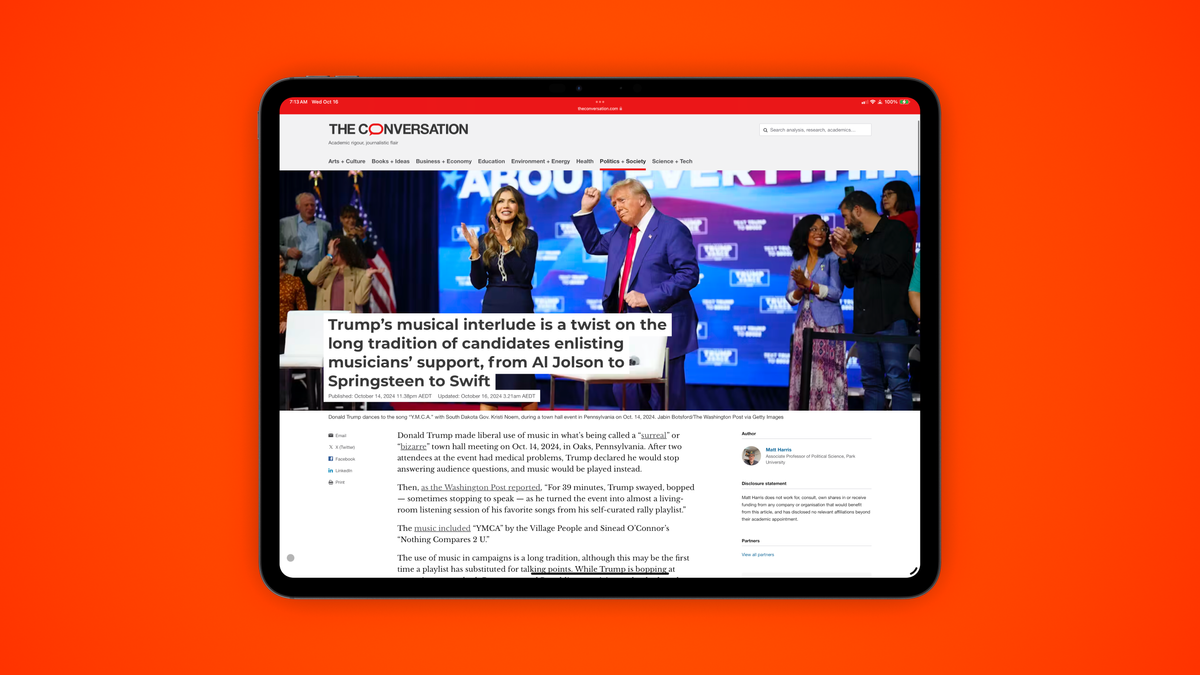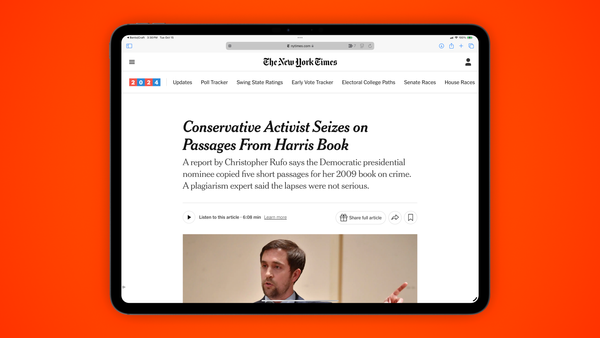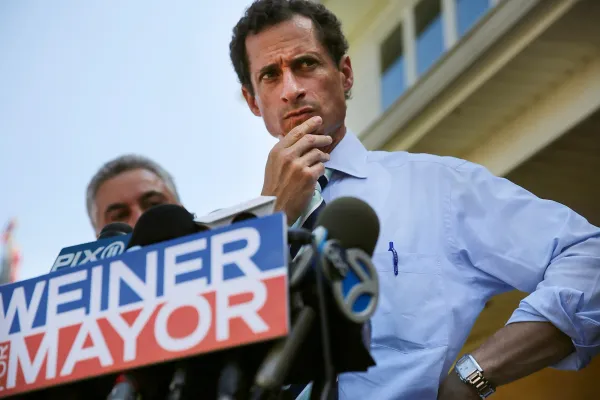No, Trump's Weird-Ass Dance Party is not Part of a Tradition

How The Conversation’s article on Trump’s DJ session missed the mark and normalized a campaign fiasco.
Donald Trump just ditched his own town hall questions for a surprise DJ set. Ridiculous? Definitely. But somehow, Matt Harris in The Conversation frames this surreal stunt as just another day on the campaign trail. This is modern political reporting—where a candidate’s playlist gets the same attention as their literal fascism and we’re supposed to just nod along.
This is an article that tries so hard to stay neutral, it ends up normalizing the absurd. And it shows how the media spins a political meltdown into just another pop culture moment, serving up false equivalencies and leaving critical analysis in the dust.
Trump's musical interlude is a twist on the long tradition of candidates enlisting musicians' support, from Al Jolson to Springsteen to Swift
The headline immediately sets a problematic tone. By framing Trump's actions as part of a "long tradition," it normalizes what is, in fact, an utterly bizarre campaign event that would, on its own, have been career-ending for anyone else. This false equivalence between Trump's impromptu DJ session and the deliberate enlistment of musician support misrepresents the horsefuckery on dispay and misleads readers from the outset.
Donald Trump made liberal use of music in what's being called a "surreal" or "bizarre" town hall meeting on Oct. 14, 2024, in Oaks, Pennsylvania. After two attendees at the event had medical problems, Trump declared he would stop answering audience questions, and music would be played instead.
This paragraph attempts to present a veneer of objectivity by using phrases like "what's being called," but it fails to provide crucial context. The decision to play music instead of addressing constituents' concerns is not merely "surreal" or "bizarre" - it's a fundamental dereliction of a candidate's duty. The article's “neutral” tone here masks the severity of Trump's actions, normalizing behavior that would be seen as deeply fucking troubling for any other presidential candidate.
Then, as the Washington Post reported, "For 39 minutes, Trump swayed, bopped — sometimes stopping to speak — as he turned the event into almost a living-room listening session of his self-curated rally playlist."
This.
This right here was the story.
For any normal observer, this right here is the story.
Not for Matt Harris.
The use of music in campaigns is a long tradition, although this may be the first time a playlist has substituted for talking points. While Trump is bopping at campaign events, both Democrats and Republicans anticipate what looks to be another coin flip election that could come down to a few hundred thousand votes in a handful of states. Every voter matters – no matter how you reach them. With that in mind, Democrats are communicating not just on matters of policy, but matters of pop culture.
I'd call this a masterclass in false equivalence and misdirection but that'd be giving it too much credit. It clumsily and pretentiously attempts to draw a parallel between Trump's avoidance of substantive discussion and Democrats' use of pop culture references in their campaigns. This comparison is not just inaccurate; it's intellectually dishonest. The article fails to distinguish between strategic cultural engagement and an outright refusal to engage with voters on policy issues.
Specifically, Democrats are embracing football and Taylor Swift. The Harris-Walz campaign trotted out endorsements from 15 Pro Football Hall of Famers and sells Swiftie-style friendship bracelets on its campaign website, among other overtures. Swift herself has endorsed Kamala Harris.
By pivoting to Democrats' pop culture strategies without addressing the fuckity-fucked-up nature of Trump's actions, the article creates a false narrative of equivalence. This shift in focus normalizes Trump's behavior by suggesting that all candidates engage in similar tactics, when in reality, there's a vast difference between leveraging cultural touchstones and refusing to engage in political discourse while Dad-Dancing on stage to the gentle music in your own head as you inflict random tunes on your bored audience.
A sea of 'Coach Walz' signs in red, white and blue, held up by people in a crowd.
The Harris-Walz campaign is definitely stressing Walz's football coach background. Bill Clark/CQ-Roll Call, Inc via Getty Images
Tim Walz cited his experience as a football coach and mentioned Swift in the vice presidential debate.
Still kicking around the problematic equivalence football, now visually reinforced with an image. By juxtaposing Walz's legitimate background as a coach with Trump's bizarro musical antics, Matt Harris further blurs the lines between strategic campaign messaging and erratic behavior.
Democratic challenger and former NFLer Colin Allred, who is running to unseat GOP Sen. Ted Cruz of Texas, has put out ads in which he appears moments from taking to the gridiron.
Again, the article equates a candidate's relevant personal history with Trump's seemingly random musical interlude. This false equivalence diminishes the worrying seriousness of Trump's actions while trivializing Allred's campaign strategy.
But how much does pop culture campaigning, if you will, matter? Does trying to link a campaign to a sport, or a culture, or a style of music actually influence elections? Looking to five different election campaigns in the past can give a sense of the effects, or lack thereof, of such campaigning.
Here, the article pivots to a broader discussion of pop culture in campaigning, further diluting the significance of Trump's actions. By framing Trump's behavior as just another example of "pop culture campaigning," the piece fails to critically examine the fundamental differences between strategic cultural engagement and avoiding substantive political discourse.
The remainder of the article continues this pattern, providing historical examples of candidates engaging with popular culture without adequately distinguishing between these strategic moves and Trump's apparent abdication of campaign responsibilities. This not only fails to provide meaningful analysis it misleads readers about the nature and implications of Trump's disqualifying weirdness. And it sure as shit fails to answer the question: should this man be in charge of nuclear codes?
This is a failure of critical journalism. By equating Trump's bizarre town hall behavior with legitimate campaign strategies, it normalizes shit that should be scrutinized. It prioritizes a narrative of equivalence over substantive analysis, potentially leaving readers with a distorted view of both historical campaign tactics and current political events.
It's a swing and a motherfucking miss.




